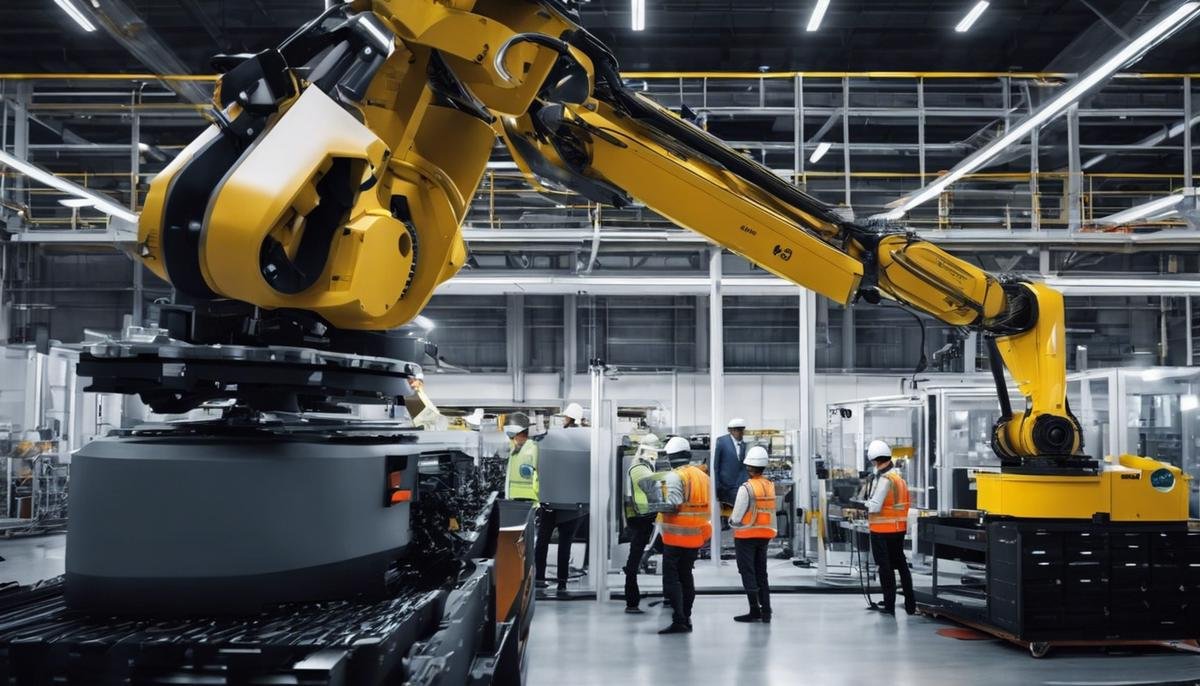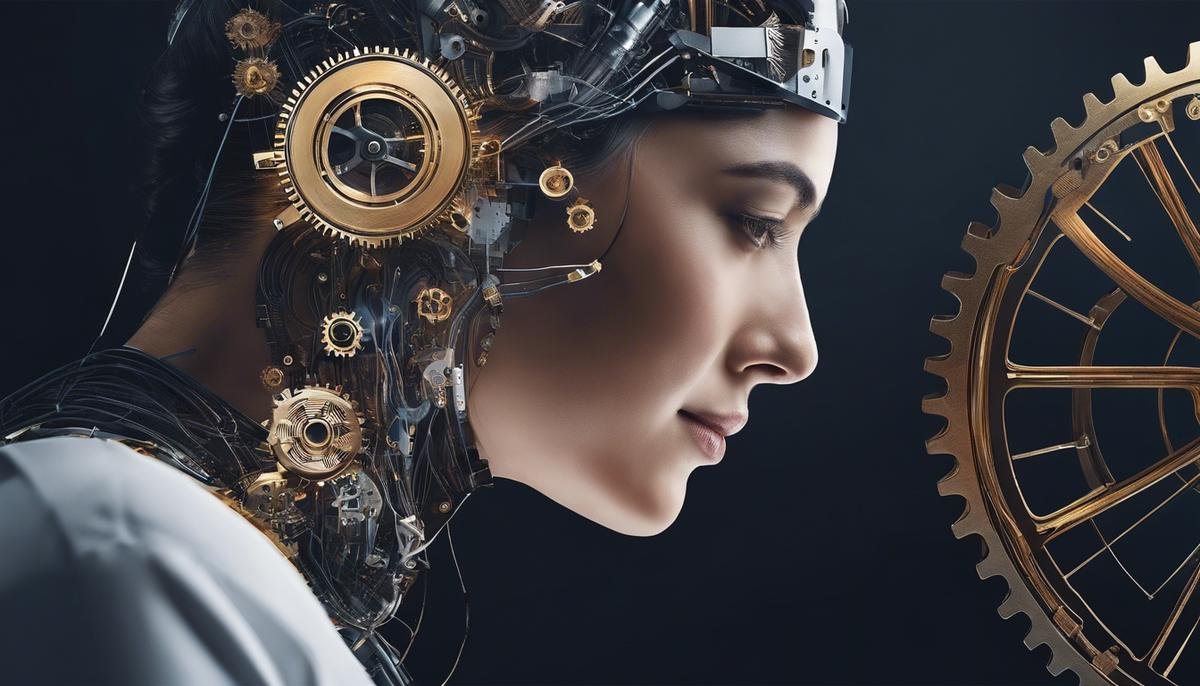As we stand at the precipice of a new era in technology, the influence of artificial intelligence on the European labor market commands our attention and scrutiny. AI, teeming with brilliance and innovation, carries with it a suite of complex challenges and revives critical debates about workers’ rights and protections. This analysis seeks to unravel the intricate tapestry of AI’s role in redefining job structures, rights, and the responsibilities of employers under the umbrella of European labor law. It is a deep dive into the current landscape, examining the ways in which AI-driven automation interacts with traditional workforce protocols and necessitates a reconsideration of how we support and maintain a fair working environment for all.
The Intersection of AI and European Labor Law
Title: The Impact of Artificial Intelligence on Labor Rights in the European Union
The onset of Artificial Intelligence (AI) in the workforce heralds a new era in labor dynamics within the European Union (EU). The potential of AI to transform industries is undeniable, and as it becomes more integrated into our professional spheres, traditional notions of labor rights are being subjected to rigorous scrutiny and challenge.
The EU, noted for its strong worker protections, faces an intricate balancing act: integrating AI into its economy while preserving the rights and dignity of its labor force. The fundamental principles of labor rights – fair wages, reasonable working hours, and safe working conditions – seem precariously positioned against the backdrop of AI-driven automation and innovation.
AI introduces computational efficiency that outpaces human capacity. Machines, armed with algorithms, can perform tasks in seconds that might take humans hours. The imminent threat here is the displacement of workers. Sectors that rely on routine or repetitive tasks are particularly vulnerable to such technological usurpation. If machines replace human labor, what becomes of the worker’s right to gainful employment?
Furthermore, the demarcation between employee and independent contractor is blurred by the gig economy – an economy emboldened by AI systems that match freelance workers with short-term engagements. This raises the question: do such workers enjoy the same rights and protections as their full-time counterparts within the legislative frameworks of the EU?
One must also consider the ethics of AI. Machines do not tire, do not demand pay raises or vacations, and do not form unions. However, reliance on these “employees” that never switch off could engender a pressing ethical dilemma. If businesses prefer tireless AI over humans, what preventive measures do we have in place to safeguard the human right to work, and under what conditions?
The EU finds itself in need of updating its regulations to simultaneously harness the benefits of AI and uphold labor standards. The European Pillar of Social Rights is a testament to this endeavor, emphasizing fair working conditions in the age of digitalization. Yet, the enforcement and precise tailoring of these rights to an AI-driven job market remain an ongoing challenge.
The dialogue between policymakers, businesses, labor unions, and AI developers is crucial. Prioritizing human-centric AI development could be the differentiating factor that maintains the integrity of labor rights. The European approach, thus far, has been one of cautious optimism, striving to ensure that as AI reshapes the labor market, the rights of human workers are not relegated to an afterthought but are re-examined and reinforced for a new technological age.
In conclusion, AI stands as both a beacon of progress and a test to the resilience of labor rights within the EU. As the EU navigates through these transformative times, it is imperative to sustain a labor market that is equitable and human-centered, lest we undermine the very rights that constitute the cornerstone of our social contract in the workforce.

Worker Rights in the Age of AI
The Prospect of Enhanced Productivity and Efficiency
Artificial Intelligence (AI) stands at the forefront of creating unparalleled opportunities for enhanced productivity and efficiency in the European workforce. Automated systems have the potential to execute tasks with a speed and precision beyond human capability, promising a significant augmentation of the work environment. This can lead to the optimization of resources, reducing time spent on mundane tasks and enabling workers to focus on more creative and intellectually stimulating activities.
However, as AI systems are increasingly deployed, they may lead to a reconceptualization of job roles and the redistribution of work tasks within organizations. This shift necessitates a nuanced understanding of how to effectively leverage human-AI collaborations to bolster, rather than diminish, the value of the human workforce.
The Dual-edged Sword of AI and Job Creation
The advent of AI might also be a catalyst for the creation of new jobs and industries, just as the industrial revolution did centuries ago. The surge in demand for AI expertise and technology could lead to the emergence of new professions centered around the development, maintenance, and ethical governance of AI systems.
Despite these potential opportunities, we must contend with the precarious nature of new AI-related jobs. The volatility in demand for specific AI skills and the rapid evolution of technology may introduce instability in job security. Moreover, this could widen the skills gap, creating a chasm between the low-skilled unemployed and those adept in cutting-edge AI technologies.
The Critical Role of Digital Skills Development
As AI becomes ubiquitous in various sectors, it stands to reason that digital literacy and AI competency will be essential for workforce adaptation. In this respect, the implementation of comprehensive digital skills programs is crucial. These programs should aim to engender a digitally adept workforce, capable not only of interfacing with AI systems but also of contributing to their evolution and oversight.
Digital skill development, however, cannot just be a byword for theoretical knowledge; it must also provide practical, hands-on experiences that empower the workforce to navigate and direct the AI-driven landscape of tomorrow.
The Balance Between Supervision and Autonomy
In contemplating the deployment of AI in work processes, a critical balance must be struck to ensure appropriate supervision of AI systems without stifling the benefits that autonomous functions can provide. The European workforce faces the challenge of ensuring that AI systems enhance decision-making while being closely monitored to prevent biases, errors, or actions that could undermine workers’ rights or safety.
The Prospect of AI in Enhancing Workers’ Well-being
AI systems could potentially enhance workers’ well-being by alleviating the burden of hazardous or physically demanding tasks. The capacity of AI to predict and prevent workplace accidents through data analysis and pattern recognition could significantly improve workplace safety. This is of paramount importance and a stark reminder that technology should ultimately serve to elevate the primary concern for the welfare and dignity of every worker within the European Union.
In conclusion, the trajectory we set today in reconciling the potential risks and benefits of AI will indubitably shape European workers’ rights in the forthcoming era. Constant vigilance and proactive measures are indispensable in ensuring this transition not only uplifts economies but fortifies the foundations of labor rights in an increasingly digital future.

Regulatory Frameworks and AI
In the current discourse surrounding the intersection of burgeoning artificial intelligence technologies and the evolving labor market landscape within the European Union’s jurisdiction, it is essential to address the nascent regulatory frameworks poised to mitigate potential concerns. This article elucidates the emergent strategies that European policymakers are formulating to navigate this complex paradigm.
The European Commission has been at the forefront of efforts to establish a robust and comprehensive regulatory framework designed to harness the transformative potential of AI while safeguarding fundamental labor rights. The legal instruments currently under development are characterized by their adaptability and forward-looking vision, taking into consideration the fluid nature of AI innovation and its implications for the workforce.
A salient development in this context is the proposed Artificial Intelligence Act, which marks a landmark initiative by the EU to legislate AI applications. Central to this proposition is the classification of AI systems based on risk, which will determine the level of regulatory scrutiny and compliance requirements. High-risk AI systems, particularly those infiltrating sensitive sectors such as employment and workers’ rights, will be subject to stringent controls.
Additionally, the directive on transparent and predictable working conditions has been updated to include AI considerations. This directive aims to provide employees with clarity about the working conditions and terms of employment, an increasingly crucial matter when AI systems play a role in decision-making processes affecting workers’ roles and tasks.
Another regulatory angle comprises updates to the General Data Protection Regulation (GDPR), which underscores the right to explanation when automated decisions are made. Workers have the prerogative to understand the rationale behind AI-driven decisions that impact their employment, such as hiring, promotion, and dismissal scenarios.
Beyond the realm of legislative measures, the European Union is also fostering an environment conducive to ethical AI development through initiatives such as the High-Level Expert Group on Artificial Intelligence, which has crafted guidelines for trustworthy AI that include respect for human autonomy, prevention of harm, fairness, and explicability.
The role of the European Social Charter in this debate cannot be overstated, as it provides a comprehensive framework for protecting social and economic rights. The EU’s commitment to incorporating AI advancements within the ambit of the Charter is testament to their resolve to maintain a harmonious balance between technological progress and social welfare.
Within these regulatory frameworks, there is a notable emphasis on continuous learning and the upskilling of the workforce. The EU’s policies acknowledge that education and vocational training represent core components for empowering workers to thrive alongside AI systems rather than compete with them.
In sum, the emergent regulatory frameworks in the EU are multifaceted and dynamic, with a clear mandate to place workers’ rights at the heart of AI’s integration into labor markets. These frameworks harness a detailed understanding of AI’s capabilities and limitations, fostering a regulatory environment that catalyzes innovative strides while concurrently protecting the sanctity of the labor force’s fundamental rights. The trajectory of these policies suggests a committed and thoughtful engagement with one of the most consequential issues of our time—ensuring that as the digital transformation unfolds, it does so with a profound respect for the dignity of labor and the human individuals engaged within the European labor market.

Collective Bargaining and AI
The Role of Collective Bargaining in Shaping an AI-Inclusive Future for the European Union
Collective bargaining stands as a bastion of worker empowerment, a process through which employees, through their unions, negotiate contracts with their employers to establish wages, working conditions, and other fundamental aspects of work life. In the European Union, a region marked by a strong tradition of labor rights and social dialogue, collective bargaining is poised to play a pivotal role in integrating Artificial Intelligence (AI) into the labor market in a manner that respects and preserves these rights.
As AI systems become more prevalent, the intrinsic dynamic of work relationships is poised for transformation. Traditional collective bargaining frameworks will need to evolve to encapsulate the complexities introduced by AI. The development of AI can influence collective agreements on multiple levels, including employee training, job classification, workload management, and performance assessment.
Furthermore, collective bargaining could serve as an effective instrument to mitigate the risk of polarization in the labor market, where high-skill jobs proliferate alongside a rise in low-skill, insecure work scenarios. By negotiating the terms of training and development programs, unions can ensure that workers acquire essential digital competencies, thereby fostering an inclusive environment that benefits all.
One of the most notable facets where AI intersects with collective bargaining is in the realm of data rights. Workers’ data rights and privacy protection are likely to become salient points of negotiation. Union representatives may collectively bargain for transparent algorithms and the right to contest AI-driven decisions, thereby safeguarding employees against opaque or discriminatory AI practices.
In addition, the relevance of income distribution mechanisms is enhanced by AI’s capacity to generate significant productivity gains. Collective bargaining must consider how the value created by AI is allocated among stakeholders, emphasizing fair compensation and the equitable sharing of the fruits of increased efficiency.
It is imperative for collective bargaining entities to preemptively construct agreements that address potential conflict points, such as the redeployment of workers affected by AI and the negotiation of safety nets for those displaced. This foresight will be instrumental in nurturing a climate of cooperation rather than contention as the workforce transitions.
Moreover, AI’s contribution to health and safety is an area ripe for exploration within collective bargaining. Negotiations can extend to the implementation of AI-powered tools to reduce workplace hazards and enhance occupational health measures, reinforcing workers’ well-being as a central consideration.
In navigating the intersection of AI and collective bargaining, the European Union and its member states must encourage a participatory approach. It is through such inclusivity, involving the collaborative efforts of employers, unions, and policymakers, that AI can be harnessed as a force for societal betterment, rather than a source of economic exclusion.
In conclusion, collective bargaining can provide a robust framework to welcome AI into the fabric of the European workforce, all the while upholding the EU’s commitment to social justice and workers’ rights. A forward-thinking, adaptive approach to collective bargaining will be indispensable in ensuring that AI serves as a partner in progress rather than an obstacle to prosperity for Europe’s workers.

The Ethical Implications of AI on Work
The ethical considerations surrounding the deployment of artificial intelligence (AI) within the European Union’s labor market extend well into the realm of work-life balance and employee well-being. The integration of AI in the workplace inevitably alters the dynamics of the traditional work environment and necessitates a re-evaluation of what constitutes fair and equitable conditions for all employees.
AI systems have the potential to reduce work-related stress and increase job satisfaction by taking over mundane or dangerous tasks, thus allowing human workers to engage in more meaningful and creative work. However, this optimistic view must be tempered by the recognition that the boundary between work and rest may become increasingly blurred as the “always on” capability of AI systems could lead to expectations of constant connectivity and availability from human employees. It is paramount for ethical standards to include clear guidelines that prevent the encroachment of work into personal time and safeguard against employee burnout.
Moreover, AI poses challenges to the traditional evaluation of performance and productivity. With AI-powered analytics, employers can gain granular insights into employees’ work patterns. While this can be beneficial for personalized professional development, it raises ethical concerns regarding privacy and surveillance in the workplace. Transparent policies must be established to ensure the respect for privacy rights and the proper use of performance data, with a focus on enhancing employee growth rather than punitive measures.
The implementation of AI also ushers in the question of diversity and equality in the workforce. AI algorithms, if not carefully audited for bias, can perpetuate existing prejudices and exacerbate inequality in hiring, promotions, and compensations. Ethical implementation of AI demands rigorous assessment for bias and the construction of AI systems that promote fairness and opportunity for all individuals, regardless of background. Failure to address these concerns may lead to a stratified workforce where the benefits of AI are not equitably distributed.
Another aspect to consider is the broader societal impact, particularly the differential effect of AI on various socioeconomic groups within the EU. While certain segments of the population may experience enhanced career opportunities due to their digital literacy and adaptability to the evolving job market, others may find themselves at a disadvantage, lacking the requisite skills to transition. Measures to mitigate these effects involve inclusive approaches to education and re-skilling programs that provide equal opportunities for all citizens to thrive in an AI-augmented economy.
Last but not least, engaging in a multinational dialogue within the EU becomes ever more critical as AI transcends borders. The ethical implications of AI in the sphere of work are not contained within a single nation but ripple across the entire union. Harmonizing regulations and ethical frameworks across member states ensures a unified stance on protecting the nature and quality of work while fostering innovation and competitiveness.
In summation, the incorporation of AI into the myriad aspects of the labor market within the European Union presents both opportunities and challenges. It is clear that the ethical implications of such an undertaking are as complex as they are significant, involving the need to carefully orchestrate the interplay between technology, human values, and the fundamental principles of equitable labor. The development of AI in the EU’s workforce must be guided by a steadfast commitment to uphold the dignity, rights, and well-being of all workers, thereby securing not only the prosperity of economies but also the sanctity of human labor.

Educating ourselves on the profound impact that artificial intelligence has on the European labor market is more than an academic exercise; it is a crucial step toward ensuring that the rights of workers are safeguarded in the digital age. As we grapple with the ethical implications and navigate the regulatory frameworks, our discussion unveils the pressing need for a harmonious integration of technology and labor safeguards. By proactively addressing the challenges and embracing the possibilities AI presents, we can cultivate a future where innovation does not come at the expense of human dignity and employment rights. The journey is intricate, but it is one that can lead to a renewed vision of the workforce, where both human aspiration and technological advancement flourish in tandem.




